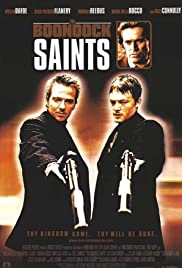The Boondock Saints
The Boondock Saints
Starring Willem Dafoe, Sean Patrick Flanery, Norman Reedus, David Della Rocco
Directed by Troy Duffy
Hollywood is notorious for butt-kissers who go about trying to get their film produced by the biggest names possible, even at the cost of their original vision. Typically this happens with those who have been in the game so long that they don't know any better, but those who are outside the mold find it more difficult to pander to the highest dollar. Troy Duffy is one such man - a lowly barman who saw a drug dealer stealing money off a dead body and decided to pen a script based around that. He wasn't a flashy Hollywood salesman or sniveling producer, but rather just an ordinary guy with an extraordinary vision, and at first things seemed to take off very well for him, but as fate would have it, the best possible outcome seemed to be his worst.
Brothers Connor (Sean Patrick Flanery) and Murphy (Norman Reedus) MacManus are devout Catholics who are sick and tired of seeing the bad guys get off and the good guys suffer, so they decide to take matters into their own hands by eliminating a powerful Russian mafia that has a stranglehold on their Boston community. This draws the interest of FBI Agent Paul Smecker (Willem Dafoe), who is confused as to how his suspects have managed to dispatch their enemies so effectively as each crime scene reeks of messiness, which propels him to try and find out who's behind he killings - but also gaining an admiration for the MacManus's effectiveness.
Originally, "The Boondock Saints" was picked up by Miramax under the supervision of Harvey Weinstein, and given fifteen million dollars to film it, even giving Duffy full control of the project - directing, writing, and including his band (The Brood) to produce the soundtrack, and a list of big-name actors were considered for the roles, including Kenneth Branagh, Keanu Reeves, Ewan McGregor, and Ethan Hawke. Yet Duffy's offhand mannerisms quickly drew the ire of the elites (especially Branagh, after Duffy left a nasty voicemail message for), and Miramax pulled out of the project. It was eventually picked up again by Franchise Pictures, and given a very paltry $6 million dollar budget, but Duffy was truly able to do the film as he saw fit, resulting in a cult classic that's withstood the tests of time and the poor initial reception in theaters.
When you consider the bigger names who were once attached to star, it easily wouldn't have been the same. Sean Patrick Flanery and Norman Reedus exude tough-as-nails brothers who also showcase extreme intelligence and quippy banter that appears so natural, you'd believe they really were brothers. David Della Rocco (whose role was so specifically created for him that his character's name is actually David Della Rocco) steals the scene though as the MacManus's friend Rocco, who wants to join their cause and brings even more dark humor to the proceedings than the brother did.
Even though this film is about the MacManus brothers, the real star of the show is Willem Dafoe, whose agent Smecker is a downright loon and proves that no one can play crazy better than Dafoe. Whether he's dressing up in drag, conducting an invisible orchestra or playing with a feather boa, you can't help but be drawn to him and his character. The film could've become redundant because of how Duffy told the story - you see the aftermath of a MacManus assassination with Smecker guessing what happened and then you see the actual assassination happen, which is basically seeing the same event happen twice - but with Dafoe's erratic poetic nature, it's a pure joy to see him try to deduce what's going on like a modern day Sherlock against his dim-witted foils.
The film was released right after the Columbine shooting, which severely limited its exposure to just five theaters for seven days, and was met with criticism by the critics for being too brash and violent, but that was Duffy's point - to express the evils that men with power obtain, and how sometimes the only justice is vigilante justice. The concept of the film is gritty by nature, and if it was shot with a bigger budget, that grittiness would've been lost in the translation - but thankfully with the meager budget it managed to shine through.
The movie poses an important question, one that most notably is asked during superhero movies - does the ends justify the means? Superheroes like Batman, Iron Man and the like often take the law into their own hands, and are often labeled as "vigilantes," but they're also hailed as heroes and saviors of mankind. The MacManus brothers, in this sense, are no different - they're killing really bad guys who would probably kill innocent people if they had a chance, and help clean up the streets. As with all ideas like this, there's those who are for such justice and those who think they're outside the law, and this is the conundrum that Smecker faces - a part of him wants to stop them, but a bigger part wants to join them, and he wrestles with his conscience and the law. What makes the MacManus brothers different is the fact that they feel they're led by God to bring about his divine justice, which exceeds any mortal laws, and provides a unique debate over whether or not what they do is evil themselves, or just the perfect end to justify their religious means.
Gritty, bloody, and darkly humorous, "The Boondock Saints" has cemented its cult classic status with a tremendous script, dedicated performances, and sharp-witted humor that shines through from start to finish.
The Score: A+




Comments
Post a Comment